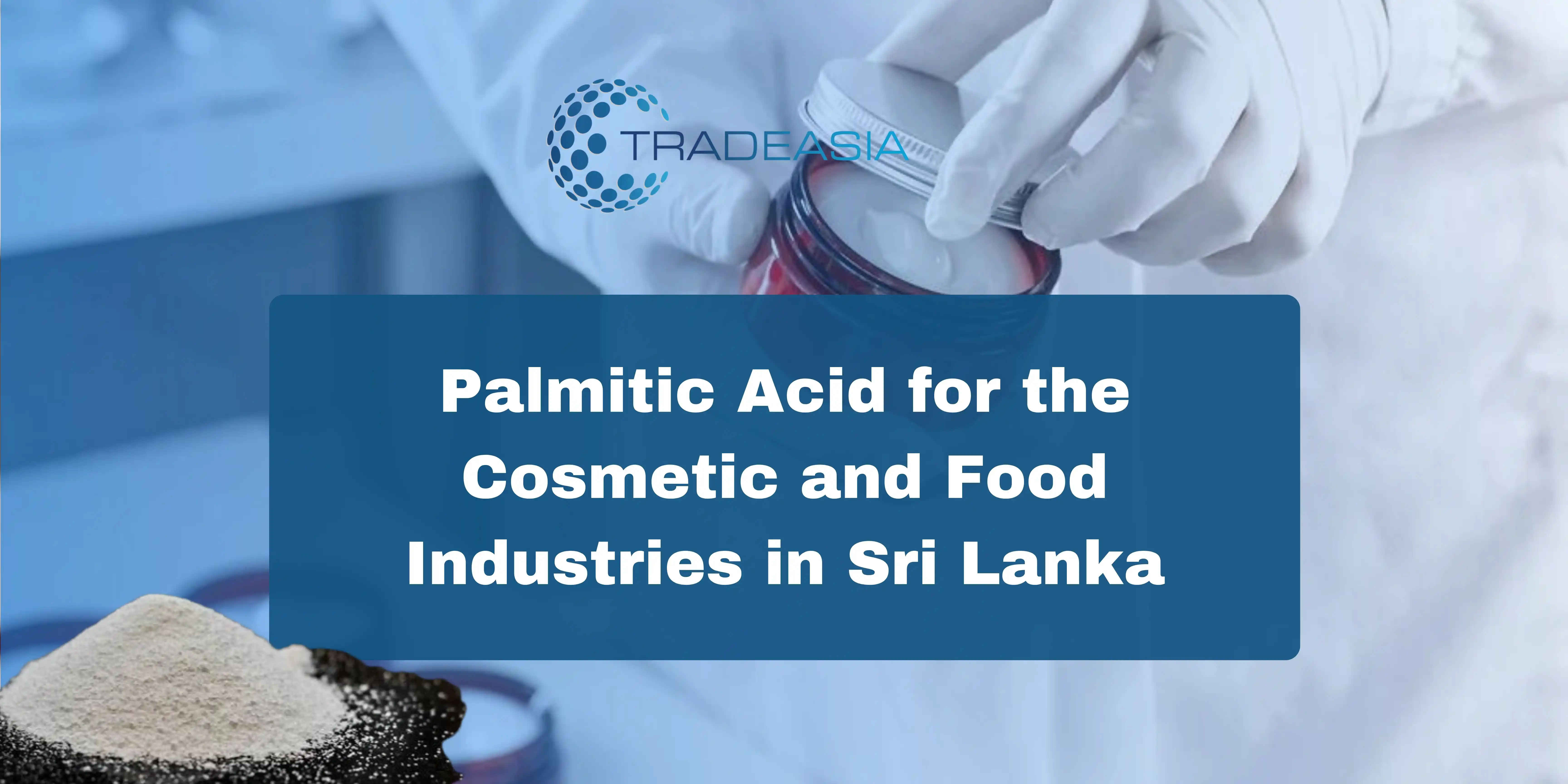Palmitic Acid for the Cosmetic and Food Industries in Sri Lanka

Table of Content
- What Is Palmitic Acid?
- Applications in the Cosmetic Industry
- Applications in the Food Industry
- Benefits of Palmitic Acid
- Market Trends and Demand in Sri Lanka
- Challenges in the Use of Palmitic Acid
- Sustainable Practices for Palmitic Acid in Sri Lanka
- Future Opportunities for Palmitic Acid in Sri Lanka
- Conclusion
Sri Lanka, renowned for its vibrant culture and thriving industries, increasingly focuses on sustainability and natural ingredients. Palmitic acid, a saturated fatty acid commonly derived from palm oil and animal fats, has become essential for the nation's cosmetic and food sectors. This article explores its applications, benefits, and the growing demand for palmitic acid in Sri Lanka's industries.
What Is Palmitic Acid?
Palmitic acid (C16H32O2) is a naturally occurring fatty acid found in plants and animals. As one of the most abundant saturated fats, it is widely used in various industrial applications due to its stability and versatility. Key sources include:
-
Palm oil: A major source, especially relevant to Sri Lanka's agricultural exports.
-
Animal fats: Rendered products that contribute to palmitic acid extraction.
-
Vegetable oils: Coconut oil and shea butter are alternative sources.
Applications in the Cosmetic Industry
Palmitic acid is highly valued in cosmetics for its emollient and stabilizing properties. It enhances the texture, performance, and shelf life of cosmetic products, making it a key ingredient in formulations such as:
-
Skin Care Products
-
Used in creams and lotions to provide hydration and a smooth feel.
-
Acts as an emulsifier, binding oil and water for consistent textures.
-
Soap and Cleansing Products
-
Makeup Products
Applications in the Food Industry
In the food sector, palmitic acid is primarily used as a stabilizer, emulsifier, and texture enhancer. Its applications include:
-
Processed Foods
-
Dairy Alternatives
-
Specialty Oils and Fats
Benefits of Palmitic Acid
-
Versatility
Palmitic acid’s ability to stabilize, thicken, and enhance makes it a multifaceted ingredient.
-
Sustainability
Sourced from renewable resources, it aligns with Sri Lanka's push for sustainable industrial practices.
-
Economic Value
Local production and utilization reduce dependency on imports, bolstering Sri Lanka's economy.
Market Trends and Demand in Sri Lanka
-
Shift Toward Natural Ingredients
With global trends favoring natural and eco-friendly products, Sri Lanka's industries increasingly incorporate palmitic acid derived from sustainable sources.
-
Growth in Cosmetic Exports
Sri Lanka's cosmetic sector is experiencing growth, fueled by rising demand for natural products internationally. Palmitic acid is integral to this trend.
-
Expanding Food Processing Industry
As Sri Lanka develops its food processing capabilities, palmitic acid remains a staple for enhancing product quality.
Challenges in the Use of Palmitic Acid
-
Environmental Concerns
Over-reliance on palm oil, a major source of palmitic acid, raises concerns about deforestation and biodiversity loss.
-
Health Implications
High consumption of saturated fats, including palmitic acid, is associated with cardiovascular risks.
-
Price Volatility
Global market fluctuations in palm oil and related raw materials impact the cost and availability of palmitic acid.
Sustainable Practices for Palmitic Acid in Sri Lanka
-
Promoting Ethical Sourcing
Encouraging the use of certified sustainable palm oil minimizes environmental impact.
-
Investing in Alternative Sources
Developing coconut-derived palmitic acid supports local agriculture and reduces reliance on imports.
-
Enhancing Recycling and Reuse
Utilizing by-products from food processing and cosmetics reduces waste and promotes a circular economy.
Future Opportunities for Palmitic Acid in Sri Lanka
-
Innovation in Product Development
Research and development can expand the uses of palmitic acid, particularly in high-value products like premium cosmetics and specialty foods.
-
Export Potential
By focusing on sustainable production, Sri Lanka can position itself as a leading exporter of palmitic acid-based products.
-
Collaboration Across Industries
Partnerships between agricultural producers, manufacturers, and research institutions can drive innovation and efficiency.
Conclusion
Palmitic acid plays a crucial role in Sri Lanka's cosmetic and food industries, offering versatility and economic value while aligning with sustainability goals. By addressing challenges and embracing opportunities, Sri Lanka can enhance its position in the global market and foster a thriving, eco-conscious industrial landscape. If you are interested in our products for your specific business needs, please do not hesitate to contact us.

Leave a Comment